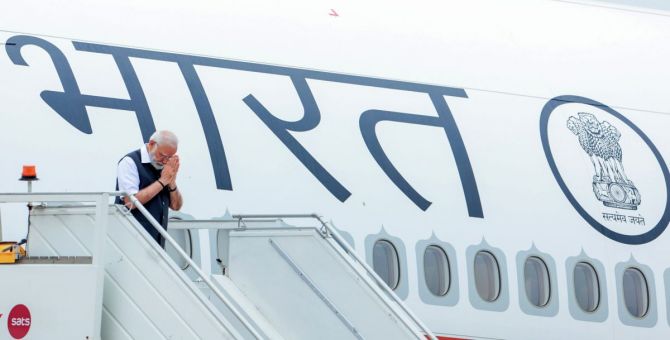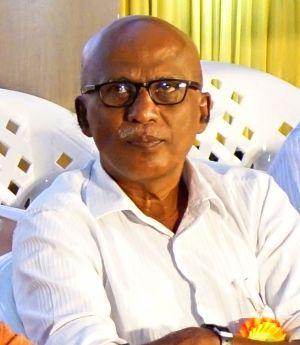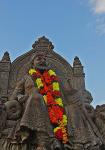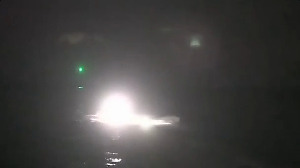'Bharat is a name that is 7,000 years old.'
'We are not saying the name of the country should be changed from India to Bharat; we only recommended that the stress should be on Bharat.'

Ever since Narendra D Modi came to power in 2014, there has been an effort to change the school syllabus.
In December 2021, the National Council of Educational Research and Training (NCERT) set up a committee for social sciences to revise the school curriculum.
This committee was one of 25 groups formed by the NCERT to make necessary changes in various subjects.
The high level committee headed by Dr C I Issac recently released some recommendations.
Dr Issac, a Padma Shri awardee and a practising Christian, has been a member of the Rashtriya Swayamsevak Sangh from his college days.
A former professor and head of the department of history at the CMS College, Kottayam, Dr Issac is currently a member of the executive council at the Kerala-based RSS think-tank, the Bharatiya Vichara Kendram.
"This sort of teaching is creating an inferiority complex in the minds of our students. They think we are not good enough. This is our failure," Dr Isaac tells Rediff.com's Shobha Warrier.
One of the recommendations made by the committee constituted by NCERT of which you were the chairperson, was replacing the name 'India' with 'Bharat' in school textbooks.
Why do you want to replace India with Bharat?
No, we didn't ask 'India' to be replaced by 'Bharat'. We want to give thrust to the word Bharat and not India.
We also don't want the textbooks to use 'India' in brackets when they use Bharat.
I see no problem using the name India; even I say India only. But we want the textbooks to use Bharat to enhance the self-esteem and confidence of students.
India is only a 150-year-old name and there are so many names like the West Indies, East Indies, Red Indians in the world.
But Bharat is a name that is 7,000 years old. Vishnu Puranam talks about the borders of Bharatam. The name Bharata was written in the Brahmi script (the main script used in ancient India from the 3rd to the 6th century).
Kalidasa spoke of Bharata. Tagore wrote, Bharata Bhagya Vidhata...
The 16th century Malayalam bhakti poet Poonthanam's Njananappana mentions Bharatam.
It is said that in the 5th century BC, the Greek historian and geographer Herodotus wrote about India, the Indus land, after the river Indus or Sindhu...
The foreigners might have called it India, but our ancient history identified this land as Bharata.
You must understand that we have never recommended that 'India' should be removed from the school textbooks.
We only said that for students of the 7th to 12th standard, the thrust should be on 'Bharat' and not 'India'. But prior to that, the textbooks can have any name.
Does that mean during those five years, the name India will not be there at all in the textbooks?
Only Bharat should be there, and not India. We want the teenage students of India should get familiarised with and feel proud of Bharat.
The chief minister of Kerala said the state would not agree with the suggestion, and if NCERT textbooks use only the name Bharat, they would not use those textbooks but print books with the name India...
He has no right to say that when he is planning to change his state's name from Kerala to Keralam! The proposal has gone to the central government.
In a nation like India where competitive exams are conducted based on the NCERT syllabus and not Kerala syllabus, how can a state have a separate syllabus? What he said exposes his ignorance.
Has the state made it easy when it changed the names of Trivandrum, Quilon, Calicut, Cochin, to Thiruvananthapuram, Kollam, Kozhikode, Kochi? No.
Other states also did the same, like Madras state became Tamil Nadu, Madras city became Chennai, Mysore state became Karnataka and Bangalore became Bengaluru...
But we are not saying the name of the country should be changed from India to Bharat; we only recommended that the stress should be on Bharat.

Do you agree with the idea of changing the country's name to Bharat?
That is for Parliament to decide, and not me. I am only the chairperson of the committee to make recommendations on school textbooks.
You have recommended that the textbooks should have classical history instead of ancient history....
The British divided the history into ancient Hindu history, medieval Muslim history and modern British history.
What they have included in the ancient history is just 'scrap' which can be dumped into a dustbin.
What we had was a golden period where many scientists like Aryabhatta, Varahamihira, Baudhayan, etc contributed immensely to science and mathematics.
When Galileo was executed (editor's note: Galileo Galilei was arrested, not executed) for saying the earth revolved around the sun, we identified the nature of earth, space, etc.
Our students should learn about this classical golden period of India. That's why we suggested to introduce classical period of Indian history and not ancient history.
Another recommendation of the committee was to have the Indian Knowledge system. Can you elaborate on that?
See, India has a wonderful knowledge system which include architecture, science, mathematics, Ayurveda, etc.
Do you know it was Sangamagrama Madhavan who invented calculus though according to the world, Isaac Newton is the father of calculus? Long before Isaac Newton, in the 14th century, Sangamagrama Madhavan, a Malayali mathematician, had made contributions to calculus.
Why do you not teach the students about the wonderful medical system called Ayurveda?
I am not asking to teach the knowledge system, but inform the students about the knowledge system these great people had followed.
We only want to make the students aware of the knowledge system we once had.

You also want to highlight 'Hindu victories' in the textbooks. Why do you want to highlight only Hindu victories when India has people belonging to so many religions?
Madam, Hindu is not a religion. It is a dharma, the Hindu dharma. Europeans introduced the Hindu religion.
For us, it is only Hindu dharma like we have so many other dharma or systems of faith like Jainism, Buddhism, Vaishnavism, Saivism, etc.
In ancient history, for example, they mention about Mohammed Ghori's victory, but not his defeats.
Marthanda Varma, the king of Travancore, defeated the Dutch East India company in the Battle of Colachel in 1741.
Even the students in Kerala are unaware of this battle and also Marthanda Varma. That is the tragedy.
In Wayanad, Thalakal Chandu led an army of tribals armed with bows and arrows against the British East India Company Soldiers. How many know about Thalakal Chandu?
All these victories were deliberately excluded from our history.
Deliberately by who?
By vested interests. By the Left historians who have no faith in India or the Indian faith system or India's progress.
The British had faced many challenges from Indian kings, but these challenges or their victories are not taught to Indian students. They are taught only the defeat of Indian rulers.
This sort of teaching is creating an inferiority complex in the minds of our students. They think we are not good enough. This is our failure.
I have no vested interest in making suggestions to include our scientific achievements, our victories and our contributions.
I only want to increase the confidence and self-esteem of our students.

Was there any pressure from the BJP or the government to make these recommendations, like using Bharat instead of India in the textbooks?
Nobody influenced or pressured me. I have no political relations.
I made these suggestions based on the teaching experience I had in a reputed 200-year-old college, and also my reading. And my specialisation is history.
I am 71 now and for the last 30 years, I have been thinking that a change is essential.
You joined the RSS when you were 18. What attracted you, a Christian, to a Hindu organisation?
I was attracted by their discipline and commitment to the nation. They were not violent or destructive.
I was also attracted by the respect they had for teachers.
It was these three qualities that attracted me to the RSS.
 IMAGE: Dr C I Isaac
IMAGE: Dr C I IsaacWas there no conflict in your religious beliefs and the RSS ideology which is very Hindu?
There is no conflict at all. You should also understand that Hindu is not a religion; it is a dharma.
Hindu is a national identity. People living in this land are Hindus and the land is called Hindustan.
I deliberately avoided the word Hindustan in our recommendations as it will create a lot of hue and cry.
The RSS is not a publicity-oriented organisation, and that is their problem. So, people have misconceptions about them.
Not many know about what the swayamsevaks do during the calamities.
Though I support the RSS ideology, I don't involve myself with their activities.
Does your church have no problem with your association with the RSS?
My church is a Protestant church, a liberal church, and it has never created any problem in our political life.
My spiritual life is different from my political life. I go to church every Sunday. The RSS never asked me to be a Hindu and my church never questioned what I was doing politically.
So, there is no confrontation between my political ideology and personal belief.
Feature Presentation: Aslam Hunani/Rediff.com











